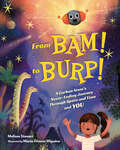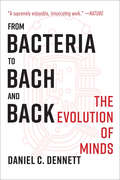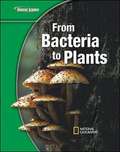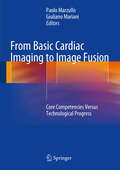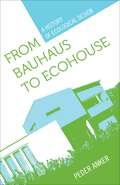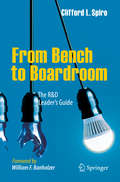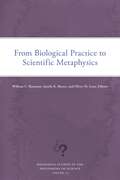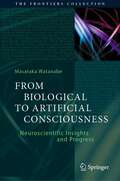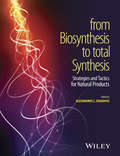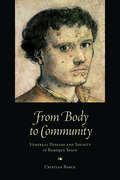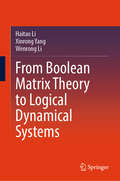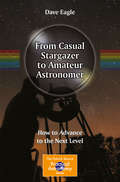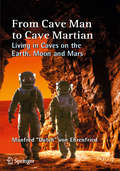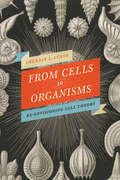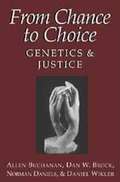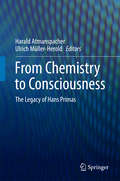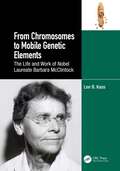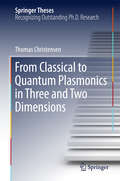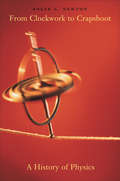- Table View
- List View
From BAM! to BURP!: A Carbon Atom's Never-Ending Journey Through Space and Time and YOU
by Melissa StewartFollow a carbon atom on its incredible adventure over billions of years. It&’s been part of many things—from early volcanic gases, to plants that dinosaurs devoured, to your breakfast burp!By award-winning children&’s author Melissa Stewart, this epic nonfiction picture book for 5-8-year-olds is a perfect blend of science and history that STEM-seekers will eat up!Long ago, the young Earth crashed into a smaller body called Theia. Matter blasted through space, and the carbon atom was trapped deep inside Earth until a volcano erupted, thrusting tons of ash and gases—including the carbon atom—high into the sky.Over millions of years, the carbon atom has been part of all kinds of things, including plants and dinosaurs, eggshells and seashells, a lump of coal, and even a sheet of toilet paper! Not long ago, it became part of a towering maple tree and then a drop of maple syrup. Just imagine that the syrup ended up on YOUR pancakes and then inside your body. And when you let out a deep breath, the carbon left your lungs, met up with a blast of gas from your stomach, and . . . BURP!You never know where a carbon atom will go next. . . . Get ready to take off on a wild ride, From BAM! to BURP!
From Bacteria To Plants
by Michael J. PadillaA science textbook by Michael J. Padilla. Part of the series: "The Nature of Science and Technology" The Nature of Science and Technology, introduces students to the sciences, scientific methods, skills, and technology and design concepts they'll need to succeed in middle grades science.
From Bacteria to Bach and Back: The Evolution of Minds
by Daniel C. DennettOne of America’s foremost philosophers offers a major new account of the origins of the conscious mind. How did we come to have minds? For centuries, this question has intrigued psychologists, physicists, poets, and philosophers, who have wondered how the human mind developed its unrivaled ability to create, imagine, and explain. Disciples of Darwin have long aspired to explain how consciousness, language, and culture could have appeared through natural selection, blazing promising trails that tend, however, to end in confusion and controversy. Even though our understanding of the inner workings of proteins, neurons, and DNA is deeper than ever before, the matter of how our minds came to be has largely remained a mystery. That is now changing, says Daniel C. Dennett. In From Bacteria to Bach and Back, his most comprehensive exploration of evolutionary thinking yet, he builds on ideas from computer science and biology to show how a comprehending mind could in fact have arisen from a mindless process of natural selection. Part philosophical whodunit, part bold scientific conjecture, this landmark work enlarges themes that have sustained Dennett’s legendary career at the forefront of philosophical thought. In his inimitable style—laced with wit and arresting thought experiments—Dennett explains that a crucial shift occurred when humans developed the ability to share memes, or ways of doing things not based in genetic instinct. Language, itself composed of memes, turbocharged this interplay. Competition among memes—a form of natural selection—produced thinking tools so well-designed that they gave us the power to design our own memes. The result, a mind that not only perceives and controls but can create and comprehend, was thus largely shaped by the process of cultural evolution. An agenda-setting book for a new generation of philosophers, scientists, and thinkers, From Bacteria to Bach and Back will delight and entertain anyone eager to make sense of how the mind works and how it came about.
From Bacteria to Plants
by Glencoe Mcgraw-HillDiscover the Flexibility to Teach Science Your Way!. "Glencoe Science: From Bacteria to Plants," a module in the Glencoe Science 15 book series, provides students with accurate and comprehensive coverage of middle school National Science Education Standards. Concepts are explained in a clear, concise manner, and are integrated with a wide range of hands-on experiences, critical thinking opportunities, real-world applications, and connections to other sciences and to non-science areas of the curriculum. Co-authored by National Geographic, unparalleled graphics reinforce key concepts. A broad array of print and technology resources help differentiate and accommodate all learners. The modular approach allows you to mix and match books to meet your specific curriculum needs.
From Bacteria to Plants (Prentice Hall Science Explorer)
by Jan JennerScience Textbook for 6th through 8th grade
From Basic Cardiac Imaging to Image Fusion
by Giuliano Mariani Paolo MarzulloThe recent development of three-dimensional imaging techniques has provided an enormous amount of information relevant to the clinical management of patients at low and high risk for coronary artery disease. However, while progress in each individual technique has been rapid, the correlation of findings obtained with radiology, nuclear medicine, and magnetic resonance imaging is still relatively neglected. In this book, qualified experts in cardiac imaging present the basic concepts of cardiac pathology and imaging and compare the findings obtained in particular subspecialties with those acquired using other techniques. In this way the reader will learn how images and techniques can be integrated in clinical practice to the benefit of the patient. In addition, it is explained how appropriate multimodality integration can reduce the patient's exposure to ionizing radiation. Physicians ranging from cardiac surgeons to internal medicine specialists and even public health administrators will find this book invaluable in understanding the role of hybrid cardiac imaging.
From Bauhaus to Ecohouse: A History of Ecological Design
by Peder AnkerGlobal warming and concerns about sustainability recently have pushed ecological design to the forefront of architectural study and debate. As Peder Anker explains in From Bauhaus to Ecohouse, despite claims of novelty, debates about environmentally sensitive architecture have been ongoing for nearly a century. By exploring key moments of inspiration between designers and ecologists from the Bauhaus projects of the interwar period to the eco-arks of the 1980s, Anker traces the historical intersection of architecture and ecological science and assesses how both remain intertwined philosophically and pragmatically within the still-evolving field of ecological design.The idea that science could improve human life attracted architects and designers who looked to the science of ecology to better their methodologies. Walter Gropius, the founder of the Bauhaus school, taught that designed form should follow the laws of nature in order to function effectively. With the Bauhaus movement, ecology and design merged and laid the foundation of modernist architecture. Anker discusses in detail how the former faculty members of the Bauhaus school -- including László Maholy-Nagy and Herbert Bayer -- left Nazi Germany in the mid-1930s and engaged with ecologists during their "London period" and in the U.S. A subsequent generation of students and admirers of Bauhaus, such as Richard Buckminster Fuller and Ian McHarg, picked up their program, and -- under the general banner of merging art and science in the design process -- Bauhaus-minded architects began to think ecologically while some ecologists lent their ideas to design. Anker charts complicated currents of ecological design thought spanning pre-- and post--World War II and through the cold war, including pivotal changes such as the emergence of space exploration and new theories on closed-system living in space capsules, space stations, and planetary colonies. Space ecology, Anker explains, inspired leading landscape designers of the 1970s, who used the imagined life of astronauts as a model for how humans should live in harmony with nature. Theories of how to design for extraterrestrial living impacted design and ecological thinking for earth-based living as well, as evidenced in Disney's Spaceship Earth attraction as well as in the Biosphere 2 experiments in Arizona in the early 1990s. Illuminating important connections between theories about the relationship between humans and the built environment, Anker's provocative study provides new insight into a critical period in the evolution of environmental awareness.
From Bench to Boardroom
by Clifford L. Spiro William BanholzerThis must-read guide offers a practical and engaging introduction to the ins and outs of R&D leadership. Innovation is a two-trillion-dollar industry, and, on top of the baseline complexity faced by any manager, the R&D or Innovation leader confronts an additional set of challenges.Armed with years of experience in roles ranging from scientist to Vice President of R&D to founder of his own company to innovation career coach, Dr. Clifford L. Spiro shares his insights on a carefully curated selection of topics. This indispensable playbook covers:Building, managing, and motivating a teamSetting schedules and goalsAssessing and rewarding project successWorking with other departmentsLegal and intellectual property considerationsDr. Spiro’s distinctive blend of big-picture strategic thinking and day-to-day, nitty-gritty tips (e.g., Five Great Questions For R&D Managers to Ask Every Time) is essential reading for current and aspiring R&D leaders through seasoned managers as well as anyone at an organization that has an R&D, innovation, or technology transfer component. Providing a prescriptive, in-the-trenches assessment of how to lead innovation more effectively, this book ably equips the reader to anticipate potential problems and to succeed both within the R&D department and across his or her company.
From Biological Practice to Scientific Metaphysics (Minnesota Studies in the Philosophy of Science #23)
by Oliver M. LeanHow analyzing scientific practices can alter debates on the relationship between science and reality Numerous scholarly works focus solely on scientific metaphysics or biological practice, but few attempt to bridge the two subjects. This volume, the latest in the Minnesota Studies in the Philosophy of Science series, explores what a scientific metaphysics grounded in biological practices could look like and how it might impact the way we investigate the world around us. From Biological Practice to Scientific Metaphysics examines how to reconcile the methods of biological practice with the methods of metaphysical cosmology, notably regarding the origins of life. The contributors take up a wide range of traditional metaphysics and philosophy of science topics, including natural kinds, medicine, ecology, genetics, scientific pluralism, reductionism, operationalism, mechanisms, the nature of information, and more. Many of the chapters represent the first philosophical treatments of significant biological practices. From causality and complexity to niche constructions and inference, the contributors review and discuss long-held objections to metaphysics by natural scientists. They illuminate how, in order to learn about the world as it truly is, we must look not only at what scientists say but also what they do: for ontology cannot be read directly from scientific claims. Contributors: Richard Creath, Arizona State U; Marc Ereshefsky, U of Calgary; Marie I. Kaiser, Bielefeld U; Thomas A. C. Reydon, Leibniz U Hannover and Michigan State U; Lauren N. Ross, U of California, Irvine; Rose Trappes, U of Exeter; Marcel Weber, U of Geneva; William C. Wimsatt, U of Chicago. Retail e-book files for this title are screen-reader friendly with images accompanied by short alt text and/or extended descriptions.
From Biological to Artificial Consciousness: Neuroscientific Insights and Progress (The Frontiers Collection)
by Masataka WatanabeHow does consciousness emerge from a brain that consists only of physical matter and electrical / chemical reactions? The deep mysteries of consciousness have plagued philosophers and scientists for thousands of years. This book approaches the problem through scientific studies that shed light on the neural mechanism of consciousness, and furthermore, delves into the possibility of artificial consciousness, a phenomenon that may ultimately solve the mystery. Finally, two key suggestions made in the book, namely, a method to test machine consciousness and a theory hypothesizing that consciousness emerges from a neural algorithm, reveal a novel and credible pathway to mind-uploading.The original Japanese version of this book has become a best-seller in popular neuroscience and has even led to a neurotech startup for mind-uploading.
From Biosynthesis to Total Synthesis: Strategies and Tactics for Natural Products
by Alexandros L. ZografosFocusing on biosynthesis, this book provides readers with approaches and methodologies for modern organic synthesis. By discussing major biosynthetic pathways and their chemical reactions, transformations, and natural products applications; it links biosynthetic mechanisms and more efficient total synthesis. * Describes four major biosynthetic pathways (acetate, mevalonate, shikimic acid, and mixed pathways and alkaloids) and their related mechanisms* Covers reactions, tactics, and strategies for chemical transformations, linking biosynthetic processes and total synthesis* Includes strategies for optimal synthetic plans and introduces a modern molecular approach to natural product synthesis and applications* Acts as a key reference for industry and academic readers looking to advance knowledge in classical total synthesis, organic synthesis, and future directions in the field
From Body to Community: Venereal Disease and Society in Baroque Spain
by Cristian BercoKnown in early modern Europe by many names - the French Disease, the Bubas, and, eventually, syphilis - the Great Pox was a chronic disease that carried the stigma of sexuality and produced a slow and painful death. The main institution which treated it, the pox hospital, has come down to us as a stench-filled and overcrowded place that sought to treat the body and reform the soul.Using the sole surviving admissions book for Toledo, Spain's Hospital de Santiago, Cristian Berco reconstructs the lives of men and women afflicted with the pox by tracing their experiences before, during, and after their hospitalization. Through an innovative combination of medical, institutional, and notarial sources, he explores the physical and social lives of the patients. What were the social repercussions of living with a shameful disease? What did living with this chronic illness mean for careers and networks, love and families, and everyday relationships? From Body to Community is a textured analysis at once touched by the illness but not solely defined by it.
From Boolean Matrix Theory to Logical Dynamical Systems
by Xinrong Yang Haitao Li Wenrong LiThis book offers a systematic platform for the theory of Boolean matrix and its application in logical dynamical systems. As a special kind of non-negative matrix, Boolean matrix has wide applications in graph theory, discrete-event system, game theory, clustering analysis, and so on. Due to the special operations between Boolean matrices, there exist some special mathematical properties for Boolean polynomial and Boolean vector space, which necessitate a general theory of Boolean matrix. Furthermore, logical dynamical systems have received recent attention from systems biology, information security, artificial intelligence, etc. The development of logical dynamical systems needs the mathematical foundation of Boolean matrix and logical matrix. Therefore, it is necessary to explore the relation between Boolean matrix theory and logical dynamical systems. To our best knowledge, there are no published books available on both Boolean matrix theory and logical dynamical systems. This book aims to provide some recent insightful results to meet this gap. It can serve as a textbook for scholars and students of mathematics, cybernetics, biology and artificial intelligence. Especially, the book is an important reference for readers who are interested in Boolean matrix theory and logical dynamical systems.
From Casual Stargazer to Amateur Astronomer
by Dave EagleThe beginning astronomical observer passes through a series of stages. The initial stage is hugely exciting and gives the beginner a real buzz as he discovers some of the faint fuzzy objects, markings on the planets, rings around Saturn and the craters on the Moon. But as the novice observer progresses, he or she wants to know what more there is than looking at faint fuzzy blobs or indistinct planet markings. Many jump to the conclusion - wrongly - that they need to spend lots of money on expensive equipment to progress. "From Casual Stargazer to Amateur Astronomer" has been written specifically to address this group of budding stargazers. Astronomy is much more than a quick sightseeing tour. Patient observers who can develop their skills will start to appreciate what they are seeing, and will know exactly what to look out for on any particular night. And equally important, they will learn what not to expect to see. "From Casual Stargazer to Amateur Astronomer" is for those who want to develop observing skills beyond mere sightseeing, and learn some of the techniques used to carry out enjoyable - and scientifically useful - observations. It will also direct readers to make informed choices about what can be seen and when. This book is for anyone keen to develop their skills as an amateur astronomer.
From Caterpillar to Butterfly (Let's-Read-and-Find-Out Science 1)
by Deborah HeiligmanRead and find out about how a caterpillar becomes a butterfly in this colorfully illustrated nonfiction picture book.After a caterpillar comes to school in a jar, the children are captivated as it eats, grows, and eventually becomes a beautiful Painted Lady butterfly.This is a clear and appealing environmental science book for early elementary age kids, both at home and in the classroom. Plus it includes web research prompts and an activity encouraging kids to identify the different types of butterflies all around them.This is a Level 1 Let's-Read-and-Find-Out, which means the book explores introductory concepts perfect for children in the primary grades. The 100+ titles in this leading nonfiction series are:hands-on and visualacclaimed and trustedgreat for classroomsTop 10 reasons to love LRFOs:Entertain and educate at the same timeHave appealing, child-centered topicsDevelopmentally appropriate for emerging readersFocused; answering questions instead of using survey approachEmploy engaging picture book quality illustrationsUse simple charts and graphics to improve visual literacy skillsFeature hands-on activities to engage young scientistsMeet national science education standardsWritten/illustrated by award-winning authors/illustrators & vetted by an expert in the fieldOver 130 titles in print, meeting a wide range of kids' scientific interestsBooks in this series support the Common Core Learning Standards, Next Generation Science Standards, and the Science, Technology, Engineering, and Math (STEM) standards. Let's-Read-and-Find-Out is the winner of the American Association for the Advancement of Science/Subaru Science Books & Films Prize for Outstanding Science Series.
From Cave Art to Hubble: A History of Astronomical Record Keeping (Astronomers' Universe)
by Jonathan PowellSince ancient times, humans have been engaged in a continual quest to find meaning in and make sense of sights and events in the night sky. Cultures spread around the world recorded their earliest efforts in artwork made directly on the natural landscapes around them, and from there they developed more and more sophisticated techniques for observing and documenting astronomy.This book brings readers on an astronomical journey through the ages, offering a history of how our species has recorded and interpreted the night sky over time. From cave art to parchment scribe to modern X-ray mapping of the sky, it chronicles the ever-quickening development of tools that informed and at times entirely toppled our understanding of the natural world.Our documentation and recording techniques formed the bedrock for increasingly complex forays into astronomy and celestial mechanics, which are addressed within these chapters. Additionally, the book explores how nature itself has recorded the skies in its own way, which can be unraveled through ongoing geological and archaeological studies. This tale of human discovery and ingenuity over the ages will appeal to anybody interested in the field of astronomy and its rich cultural history.
From Cave Man to Cave Martian: Living in Caves on the Earth, Moon and Mars (Springer Praxis Books)
by Manfred "Dutch" von EhrenfriedThis book explores the practicality of using the existing subsurface geology on the Moon and Mars for protection against radiation, thermal extremes, micrometeorites and dust storms rather than building surface habitats at great expense at least for those first few missions. It encourages NASA to plan a precursor mission using this concept and employ a “Short Stay” Opposition Class mission to Mars as the first mission rather than the “Long Stay” concept requiring a mission that is too long, too dangerous and too costly for man’s first missions to Mars.Included in these pages is a short history on the uses of caves by early humans over great periods of time. It then describes the ongoing efforts to research caves, pits, tunnels, lava tubes, skylights and the associated technologies that pertain to potential lunar and Mars exploration and habitation. It describes evidence for existing caves and lava tubes on both the Moon and Mars. The work of noted scientists, technologists and roboticists are referenced and described. This ongoing work is moreextensive than one would think and is directly applicable to longer term habitation and exploration of the Moon and Mars. Emphasis is also given to the operational aspects of working and living in lunar and Martian caves and lava tubes.
From Cells to Organisms: Re-envisioning Cell Theory
by Sherrie L LyonsMore than a history, From Cells to Organisms delves into the nature of scientific practice, showing that results are interpreted not only through the lens of a microscope, but also through the lens of particular ideas and prior philosophical convictions. Before the twentieth century, heredity and development were considered complementary aspects of the fundamental problem of generation, but later they became distinct disciplines with the rise of genetics. Focusing on how cell theory shaped investigations of development, this book explores evolution, vitalism, the role of the nucleus, and the concept of biological individuality. Building upon the work of Thomas Huxley, an important early critic of cell theory, and more recent research from biologists such as Daniel Mazia, From Cells to Organisms covers ongoing debates around cell theory and uses case studies to examine the nature of scientific practice, the role of prestige, and the dynamics of theory change.
From Chance to Choice: Genetics and Justice
by Allen Buchanan Norman Daniels Daniel Wikler Dan BrockWritten by four internationally renowned bioethicists, From Chance to Choice is the first systematic treatment of the fundamental ethical issues underlying the application of genetic technologies to human beings. Probing the implications of the remarkable advances in genetics, the authors ask how should these affect our understanding of distributive justice, equality of opportunity, the rights and obligations as parents, the meaning of disability, and the role of the concept of human nature in ethical theory and practice. The book offers a historical context to contemporary debate over the use of these technologies by examining the eugenics movement of the late 19th and early 20th centuries. In addition, appendices explain the nature of genetic causation, gene-environment interaction, and expose widespread misconceptions of genetic determinism, as well as outlining the nature of the ethical analysis used in the book. The questions raised in this book will be of interest to any reflective reader concerned about science and society and the rapid development of biotechnology, as well as to professionals in such areas as philosophy, bioethics, medical ethics, health management, law, and political science.
From Chemistry to Consciousness
by Ulrich Müller-Herold Harald AtmanspacherThis book reflects on the significant and highly original scientific contributions of Hans Primas. A professor of chemistry at ETH Zurich from 1962 to 1995, Primas continued his research activities until his death in 2014. Over these 50 years and more, he worked on the foundations of nuclear magnetic resonance spectroscopy, contributed to a number of significant issues in theoretical chemistry, helped to clarify central topics in quantum theory and the philosophy of physics, suggested innovative ways of addressing interlevel relations in the philosophy of science, and introduced cutting-edge approaches in the flourishing young field of scientific studies of consciousness. His work in these areas of research and its continuing impact is described by noted experts, colleagues, and collaborators of Primas. All authors contextualize their contributions to facilitate the mutual dialog between these fields.
From Chromosomes to Mobile Genetic Elements: The Life and Work of Nobel Laureate Barbara McClintock
by Lee B. KassThis biography of Nobel Laureate Barbara McClintock (1902-1992) places her life and work in its social, scientific and personal context. The author examines the development of Barbara McClintock’s scientific work and her influence upon individuals and upon the fields of cytogenetics and evolutionary biology in the period from 1902 to the present. The history documents years of McClintock’s notable and lauded scientific work long before she discovered and named transposable elements in the mid-1940s for which she ultimately received the Nobel Prize. The biography employs documented evidence to expose, demystify, and provide clarity for legends and misinterpretations of McClintock’s life and work.Key Features Exposes and demystifies myths and legends told about McClintock’s time in Missouri Clarifies the changing language of genes and genetics Places in perspective the history of McClintock’s research Documents McClintock’s family and early life before college Provides documented details of McClintock’s time in Nazi Germany
From Classical to Quantum Plasmonics in Three and Two Dimensions
by Thomas ChristensenThis thesis provides a comprehensive introduction to two active research directions within the field of plasmonics: (i) nonclassical, or quantum, aspects of the plasmonic response; and (ii) two-dimensional plasmonics, a recent innovation in the field stimulated by the advent of two-dimensional materials. It discusses the fundamentals of this field in detail, and explores several current research directions. Nonclassical plasmonics has been spurred on in recent years by the tremendous technological progress in nanofabrication and optical characterization; today, it is possible to investigate the plasmonic features of nanostructures with characteristic features in the few nanometer range. The book describes and analyzes the breakdown of the classical theory under these conditions and explores several alternatives and extensions. The unique electronic and dimensional features of novel two-dimensional materials, such as graphene, lie at the core of plasmonics' most rapidly developing subfield; two-dimensional plasmonics. This thesis provides a clear and comprehensive exposition of the central features for interested researchers looking for an entry point to this riveting area.
From Clockwork to Crapshoot: A History of Physics
by Roger G. NewtonScience is about 6000 years old while physics emerged as a distinct branch some 2500 years ago. As scientists discovered virtually countless facts about the world during this great span of time, the manner in which they explained the underlying structure of that world underwent a philosophical evolution. From Clockwork to Crapshoot provides the perspective needed to understand contemporary developments in physics in relation to philosophical traditions as far back as ancient Greece. Roger Newton, whose previous works have been widely praised for erudition and accessibility, presents a history of physics from the early beginning to our day--with the associated mathematics, astronomy, and chemistry. Along the way, he gives brief explanations of the scientific concepts at issue, biographical thumbnail sketches of the protagonists, and descriptions of the changing instruments that enabled scientists to make their discoveries. He traces a profound change from a deterministic explanation of the world--accepted at least since the time of the ancient Greek and Taoist Chinese civilizations--to the notion of probability, enshrined as the very basis of science with the quantum revolution at the beginning of the twentieth century. With this change, Newton finds another fundamental shift in the focus of physicists--from the cause of dynamics or motion to the basic structure of the world. His work identifies what may well be the defining characteristic of physics in the twenty-first century.
From Clone to Bone
by Robert J. Asher Johannes MüllerSince the 1980s, a renewed understanding of molecular development has afforded an unprecedented level of knowledge of the mechanisms by which phenotype in animals and plants has evolved. In this volume, top scientists in these fields provide perspectives on how molecular data in biology help to elucidate key questions in estimating paleontological divergence and in understanding the mechanisms behind phenotypic evolution. Paleobiological questions such as genome size, digit homologies, genetic control cascades behind phenotype, estimates of vertebrate divergence dates, and rates of morphological evolution are addressed, with a special emphasis on how molecular biology can inform paleontology, directly and indirectly, to better understand life's past. Highlighting a significant shift towards interdisciplinary collaboration, this is a valuable resource for students and researchers interested in the integration of organismal and molecular biology.
